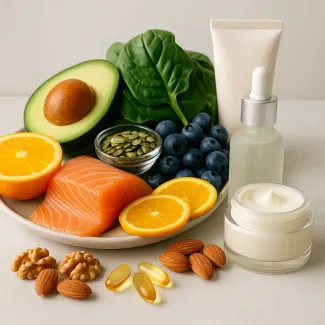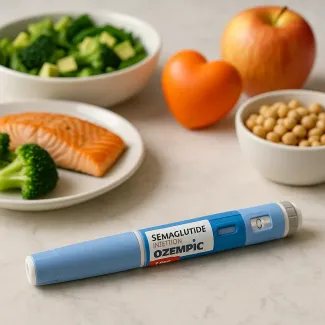
Achieving Hormonal Balance and Sustained Vitality for Women Over 40
Practical strategies for natural energy restoration and hormone support
Navigating your 40s often means recognizing new signals from your body. Hormonal shifts can contribute to persistent fatigue, mood changes, and a sense of imbalance that impacts daily life. Understanding how to naturally support hormone levels while enhancing energy can make a significant difference in overall well-being. In this comprehensive guide, we will explore practical, effective ways to help your body thrive.
Understanding the connection between hormones and fatigue
As women move past 40, hormonal fluctuations become more common. Declining levels of estrogen, progesterone, and sometimes testosterone can affect everything from energy levels to sleep quality and emotional resilience. These hormonal changes often coincide with increased cortisol production, the body’s primary stress hormone, which can further drain vitality.
The role of estrogen and progesterone in energy balance
Estrogen contributes to maintaining muscle mass, bone strength, and metabolic function. Lower levels may lead to fatigue, difficulty concentrating, and reduced endurance. Progesterone helps regulate sleep patterns and supports a calm mood. When progesterone levels drop, women may experience insomnia, restlessness, or increased anxiety.
How cortisol impacts energy and stress response
Chronically elevated cortisol can lead to exhaustion, weight gain (especially around the abdomen), and weakened immune defense. Supporting natural cortisol rhythms through stress management techniques and lifestyle adjustments is essential for restoring balance.
Key lifestyle changes to support hormonal balance
Adjusting daily habits can have a profound impact on hormone health and natural energy levels.
Prioritize restorative sleep
Quality sleep is crucial for hormonal harmony. Aim for 7 to 9 hours of uninterrupted rest. Establish a calming bedtime routine, limit exposure to screens before bed, and ensure your sleep environment is cool and dark. Magnesium-rich foods like pumpkin seeds and spinach can support better sleep.
Adopt a nutrient-dense, hormone-supportive diet
Focus on a diet rich in whole foods. Prioritize:
- Healthy fats (avocados, olive oil, flaxseeds) for hormone production
- High-fiber foods (vegetables, legumes, whole grains) to support estrogen metabolism
- Lean protein sources (chicken, fish, tofu) to maintain muscle mass and stabilize blood sugar
Avoid excessive sugar and processed foods, as these can contribute to inflammation and hormonal disruptions.
Stay active with balanced movement
Consistent, moderate exercise helps regulate hormones and improve energy. Incorporate:
- Strength training to preserve muscle mass and support metabolism
- Yoga or tai chi to reduce cortisol and promote relaxation
- Brisk walking or light cardio for heart health and endurance
Manage stress effectively
Chronic stress is a key driver of hormonal imbalance. Techniques such as mindfulness meditation, deep breathing exercises, and time spent in nature can lower cortisol and support emotional well-being.
Natural supplements that may aid hormone health
Certain nutritional supplements can provide additional support for hormone balance:
Omega-3 fatty acids
Found in fish oil or algae oil, omega-3s reduce inflammation and support hormone production.
Vitamin D
Adequate levels are essential for bone health, immune function, and hormonal regulation.
B vitamins
Crucial for energy production and mood regulation, B6 and B12 in particular aid hormone metabolism.
Adaptogens
Herbs like ashwagandha and rhodiola may help balance cortisol and improve resilience to stress.
Hydration and its role in hormonal health
Staying well-hydrated helps the body flush out toxins, supports digestion, and facilitates hormone transport. Aim for at least 2 liters of water daily, adjusting for physical activity and climate. Herbal teas like chamomile or peppermint can also be soothing additions.
Supporting gut health for hormonal balance
A well-functioning gut is key to effective hormone metabolism. Include foods rich in probiotics (such as yogurt, kefir, sauerkraut) and prebiotics (like garlic, onions, asparagus) to nurture the microbiome.
Limiting endocrine disruptors in daily life
Exposure to chemicals that interfere with hormone function can contribute to imbalance. Reduce contact with:
- BPA-containing plastics
- Certain personal care products with synthetic fragrances
- Pesticides on produce (opt for organic when possible)
The importance of regular health check-ups
Routine check-ups, including hormone panels, thyroid function tests, and vitamin assessments, can help monitor and guide your efforts toward balance. Early identification of deficiencies or imbalances ensures timely interventions.
Emotional well-being and hormone health
Emotions and hormones are deeply connected. Practices that nurture mental health, such as journaling, connecting with supportive friends, and engaging in creative hobbies, can foster inner harmony.
Creating a daily routine that promotes balance
A structured, consistent routine supports the body’s natural rhythms. Consider:
- Setting consistent wake and sleep times
- Eating meals at regular intervals
- Scheduling downtime for reflection or relaxation
The role of healthy body composition in energy levels
Maintaining a healthy ratio of muscle to fat supports metabolic health and hormone balance. Combining nutritious eating with regular physical activity is the foundation of this goal.
Tracking symptoms to understand your body
Keeping a wellness journal can reveal patterns in energy levels, mood, sleep, and other indicators of hormone health. This awareness helps tailor lifestyle adjustments more effectively.
Supporting thyroid function for overall vitality
The thyroid gland plays a key role in regulating metabolism and energy. Nutrients like iodine, selenium, and zinc are vital for thyroid health. Include sources like seaweed (iodine), Brazil nuts (selenium), and pumpkin seeds (zinc) in your diet.
Embracing mindfulness to reduce fatigue
Daily mindfulness practices have been shown to lower stress hormones and enhance feelings of vitality. Even five minutes of focused breathing or gratitude reflection can make a difference.
Balancing blood sugar for sustained energy
Stable blood sugar levels prevent energy crashes and support hormone balance. Choose complex carbohydrates, pair carbs with protein, and avoid skipping meals.
Setting realistic goals for hormone health
Small, consistent steps lead to lasting change. Focus on building habits gradually and celebrating progress along the way.
The power of connection and community
Strong social ties contribute to lower stress and better hormonal health. Make time for relationships that uplift and energize you.
When to seek professional support
If fatigue or signs of hormonal imbalance significantly affect your daily life, consulting a healthcare provider can help identify underlying causes and appropriate solutions.
Achieving Hormonal Balance and Sustained Vitality for Women Over 40
Practical strategies for natural energy restoration and hormone support
Navigating your 40s often means recognizing new signals from your body. Hormonal shifts can contribute to persistent fatigue, mood changes, and a sense of imbalance that impacts daily life. Understanding how to naturally support hormone levels while enhancing energy can make a significant difference in overall well-being. In this comprehensive guide, we will explore practical, effective ways to help your body thrive.
Understanding the connection between hormones and fatigue
As women move past 40, hormonal fluctuations become more common. Declining levels of estrogen, progesterone, and sometimes testosterone can affect everything from energy levels to sleep quality and emotional resilience. These hormonal changes often coincide with increased cortisol production, the body’s primary stress hormone, which can further drain vitality.
The role of estrogen and progesterone in energy balance
Estrogen contributes to maintaining muscle mass, bone strength, and metabolic function. Lower levels may lead to fatigue, difficulty concentrating, and reduced endurance. Progesterone helps regulate sleep patterns and supports a calm mood. When progesterone levels drop, women may experience insomnia, restlessness, or increased anxiety.
How cortisol impacts energy and stress response
Chronically elevated cortisol can lead to exhaustion, weight gain (especially around the abdomen), and weakened immune defense. Supporting natural cortisol rhythms through stress management techniques and lifestyle adjustments is essential for restoring balance.
Key lifestyle changes to support hormonal balance
Adjusting daily habits can have a profound impact on hormone health and natural energy levels.
Prioritize restorative sleep
Quality sleep is crucial for hormonal harmony. Aim for 7 to 9 hours of uninterrupted rest. Establish a calming bedtime routine, limit exposure to screens before bed, and ensure your sleep environment is cool and dark. Magnesium-rich foods like pumpkin seeds and spinach can support better sleep.
Adopt a nutrient-dense, hormone-supportive diet
Focus on a diet rich in whole foods. Prioritize:
- Healthy fats (avocados, olive oil, flaxseeds) for hormone production
- High-fiber foods (vegetables, legumes, whole grains) to support estrogen metabolism
- Lean protein sources (chicken, fish, tofu) to maintain muscle mass and stabilize blood sugar
Avoid excessive sugar and processed foods, as these can contribute to inflammation and hormonal disruptions.
Stay active with balanced movement
Consistent, moderate exercise helps regulate hormones and improve energy. Incorporate:
- Strength training to preserve muscle mass and support metabolism
- Yoga or tai chi to reduce cortisol and promote relaxation
- Brisk walking or light cardio for heart health and endurance
Manage stress effectively
Chronic stress is a key driver of hormonal imbalance. Techniques such as mindfulness meditation, deep breathing exercises, and time spent in nature can lower cortisol and support emotional well-being.
Natural supplements that may aid hormone health
Certain nutritional supplements can provide additional support for hormone balance:
Omega-3 fatty acids
Found in fish oil or algae oil, omega-3s reduce inflammation and support hormone production.
Vitamin D
Adequate levels are essential for bone health, immune function, and hormonal regulation.
B vitamins
Crucial for energy production and mood regulation, B6 and B12 in particular aid hormone metabolism.
Adaptogens
Herbs like ashwagandha and rhodiola may help balance cortisol and improve resilience to stress.
Hydration and its role in hormonal health
Staying well-hydrated helps the body flush out toxins, supports digestion, and facilitates hormone transport. Aim for at least 2 liters of water daily, adjusting for physical activity and climate. Herbal teas like chamomile or peppermint can also be soothing additions.
Supporting gut health for hormonal balance
A well-functioning gut is key to effective hormone metabolism. Include foods rich in probiotics (such as yogurt, kefir, sauerkraut) and prebiotics (like garlic, onions, asparagus) to nurture the microbiome.
Limiting endocrine disruptors in daily life
Exposure to chemicals that interfere with hormone function can contribute to imbalance. Reduce contact with:
- BPA-containing plastics
- Certain personal care products with synthetic fragrances
- Pesticides on produce (opt for organic when possible)
The importance of regular health check-ups
Routine check-ups, including hormone panels, thyroid function tests, and vitamin assessments, can help monitor and guide your efforts toward balance. Early identification of deficiencies or imbalances ensures timely interventions.
Emotional well-being and hormone health
Emotions and hormones are deeply connected. Practices that nurture mental health, such as journaling, connecting with supportive friends, and engaging in creative hobbies, can foster inner harmony.
Creating a daily routine that promotes balance
A structured, consistent routine supports the body’s natural rhythms. Consider:
- Setting consistent wake and sleep times
- Eating meals at regular intervals
- Scheduling downtime for reflection or relaxation
The role of healthy body composition in energy levels
Maintaining a healthy ratio of muscle to fat supports metabolic health and hormone balance. Combining nutritious eating with regular physical activity is the foundation of this goal.
Tracking symptoms to understand your body
Keeping a wellness journal can reveal patterns in energy levels, mood, sleep, and other indicators of hormone health. This awareness helps tailor lifestyle adjustments more effectively.
Supporting thyroid function for overall vitality
The thyroid gland plays a key role in regulating metabolism and energy. Nutrients like iodine, selenium, and zinc are vital for thyroid health. Include sources like seaweed (iodine), Brazil nuts (selenium), and pumpkin seeds (zinc) in your diet.
Embracing mindfulness to reduce fatigue
Daily mindfulness practices have been shown to lower stress hormones and enhance feelings of vitality. Even five minutes of focused breathing or gratitude reflection can make a difference.
Balancing blood sugar for sustained energy
Stable blood sugar levels prevent energy crashes and support hormone balance. Choose complex carbohydrates, pair carbs with protein, and avoid skipping meals.
Setting realistic goals for hormone health
Small, consistent steps lead to lasting change. Focus on building habits gradually and celebrating progress along the way.
The power of connection and community
Strong social ties contribute to lower stress and better hormonal health. Make time for relationships that uplift and energize you.
When to seek professional support
If fatigue or signs of hormonal imbalance significantly affect your daily life, consulting a healthcare provider can help identify underlying causes and appropriate solutions.
Simple and Effective Techniques to Regain Energy and Hormone Harmony
A practical roadmap for women over 40 to feel stronger and more balanced every day
Life after 40 can bring new challenges and unexpected shifts. Many women notice changes in how they feel, such as low energy, mood swings, or trouble sleeping. These signs often point to hormonal fluctuations that naturally happen with age. The good news is that there are proven ways to support your hormones naturally and bring back that sense of vitality. This guide offers easy-to-follow, realistic tips that fit into everyday life.
Why hormones matter for energy and well-being
Hormones are chemical messengers that control countless body functions — from how well you sleep to how energized you feel. After 40, levels of key hormones like estrogen, progesterone, and testosterone start to shift. When these hormones are out of balance, it can leave you feeling drained, foggy, or irritable.
Estrogen’s influence on strength and stamina
Estrogen helps protect bone density, maintain muscle tone, and keep metabolism steady. Lower levels can lead to fatigue, weaker muscles, and slower recovery after exercise.
The calming power of progesterone
Progesterone encourages restful sleep and helps ease anxiety. As it declines, you may experience more restlessness, insomnia, or mood changes that sap your energy.
Cortisol: the stress hormone that can steal your vitality
Cortisol levels rise with stress, and when they stay high too long, they contribute to weight gain, exhaustion, and even weakened immunity. Keeping cortisol balanced is essential for long-term energy.
Small changes that make a big difference
You don’t need a complete life overhaul to feel better. Simple, targeted adjustments can help you regain control over your energy and hormonal health.
Get consistent, quality sleep
Aim for 7-9 hours of deep, refreshing sleep. Create a bedtime routine that might include:
- Limiting screen time an hour before bed
- Enjoying a cup of herbal tea like chamomile
- Keeping your bedroom cool and dark
Magnesium-rich snacks like almonds or pumpkin seeds in the evening can also support sleep.
Focus on whole, nourishing foods
What you eat plays a major role in hormone production and energy levels. Try to:
- Include healthy fats (avocados, nuts, olive oil) for hormone support
- Choose fiber-rich foods (beans, vegetables, oats) to aid digestion and hormone balance
- Eat lean protein (fish, chicken, lentils) to stabilize blood sugar and support muscle health
Reducing processed foods and sugar can lower inflammation and help you feel more balanced.
Move your body in ways that feel good
Gentle, regular activity helps keep hormones in check. Consider:
- Strength exercises two to three times per week
- Walking outdoors for fresh air and a mood boost
- Yoga or stretching to lower stress and improve flexibility
Stay hydrated throughout the day
Drinking enough water keeps your metabolism humming and helps your body flush out waste. Aim for about 2 liters daily.
Natural helpers: vitamins, minerals, and herbs
Some nutrients and herbs can give extra support as you work toward hormonal balance.
Omega-3s for hormone production
Found in salmon, chia seeds, and supplements, omega-3s help lower inflammation and support brain and hormone health.
Vitamin D for energy and immunity
Vitamin D is vital for mood, bones, and hormone function. Safe sun exposure and fortified foods can help, or consider a supplement if needed.
B vitamins for steady energy
B6 and B12 in particular support nerve health, energy, and hormone metabolism.
Adaptogens for stress balance
Natural herbs like ashwagandha, rhodiola, and holy basil may help your body handle stress better and keep cortisol in check.
Support your gut, support your hormones
A healthy gut helps break down and eliminate excess hormones. You can support your gut with:
- Probiotic-rich foods like yogurt or kefir
- Prebiotic foods like onions, garlic, and leeks
- Plenty of fiber to keep digestion moving smoothly
Minimize exposure to hormone disruptors
Everyday products sometimes contain chemicals that mess with hormone balance. Reduce exposure by:
- Using glass or stainless-steel containers instead of plastic
- Choosing natural cleaning and personal care products
- Washing fruits and veggies to remove pesticide residues
Build a daily rhythm that suits your body
Keeping a steady routine helps your hormones stay balanced. Try:
- Waking up and going to bed at the same time each day
- Eating meals at regular intervals to support blood sugar
- Setting aside moments for rest and reflection
The link between thyroid health and energy
Your thyroid plays a major role in energy and metabolism. Nutrients that help keep it healthy include:
- Iodine from seaweed
- Selenium from Brazil nuts
- Zinc from seeds and whole grains
Mindful practices that refresh body and mind
Even a few minutes of deep breathing, meditation, or gentle stretching can lower stress hormones and promote calm.
Keep blood sugar steady
Balanced blood sugar prevents energy crashes. Tips include:
- Pairing carbs with protein or fat
- Eating small, balanced meals throughout the day
- Limiting sugary snacks that cause spikes and drops
Strengthen emotional resilience
Your mood and hormones are closely linked. Simple ways to boost emotional health include:
- Connecting with loved ones regularly
- Trying creative outlets like painting or music
- Writing in a gratitude journal to focus on positives
Know when to get extra support
If you feel constantly tired or suspect a deeper imbalance, reach out to a health professional. Tests can check hormone levels and guide treatment if needed.
Embrace small wins on the journey
Building new habits takes time. Celebrate small steps — whether it’s adding an extra serving of veggies, walking an extra block, or meditating for five minutes — every bit counts toward better hormone health and more energy.





